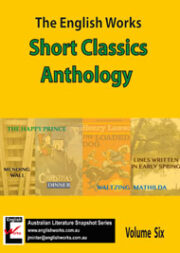A Blind Man in the Street: terminology
- To heed – to pay attention to, or notice, to heed advice (heedless)
- Note the phrase: “to take heed”: to take careful attention
- To grope – to feel around with hands in an uncertain manner
- Recompense: to make amends with; to repay or reward for service – to make a return payment
- Grudge (begrudge) – a noun and a verb – a feeling of ill will or resentment excited by some special cause, such as a personal injury or insult; to give or permit with reluctance, submit to unwillingly
- Boon – a benefit enjoyed; a thing to be thankful for, a blessing
Blind Man in the Street: What poetic techniques do we notice?
The narrator uses direct quotes (talking marks) to indicate a conversation between people walking along the street. The narrator is “we” – part of a group of people walking along heedless, nonchalant, indifferent.

The conversation sets the tone; it also provides a context to the encounter with the “blind man” and the poet’s message.
In the second stanza, the narrative focus is on “he” – a depiction of the blind man, whose experiences of groping under the “smiling skies” (note the alliteration) sets up a contrast. The conjunction “while” introduces the comparison between the blind man who is groping along, and “us” or “we” who has the benefit of enjoying new things.
The people in the street soon forget about the “blind man”; they are “lost in the sunlit afternoon”.
The poet repeats “thoughtless” twice. Why? For example, a person is thoughtless if they do not appreciate the ability to see what the “smiling skies” reveal.
The blind man does not ask for “sympathy” – rather he asks for “recompence”. Why? What should we value?
Compare C.J. Dennis’s message with the views and values of other writers in the collection.
Sample paragraph:
By beginning with dialogue (‘“He’s blind” we say’”), C.J. Dennis presents the man’s blindness as a defining feature. The conversation is presumably between strangers passing by “along the street”, observing the blind man at a distance. The pronouns “he” and “we” are repeated throughout the poem, creating a sense of otherness and distance between the dominant voice – “us” – and the blind man. He is excluded from the conversation, and by extension, society. The narrators nonchalantly observe and “pass along”. They do not offer a helping hand to the “groping figure” and cannot empathise with the “pitch black” world that envelopes him. By setting up contrasting images. C J Dennis suggests that able-bodied people are often “thoughtless”, both of others in need, but also of their “precious sense” which they take for granted.
Tasks: reflections and views and values
Write a comparison with Lachlan (from Lachlan and Griffin Two of Us, The Age). What does Lachlan value that other people do not? Give a character profile of Lachlan. (Consider the symbolism – one person’s junk is another’s treasure.)
See ABC Radio National’s competition: a special object in 500 words.
Compare this blind man to the blind men in the proverb (the blind men and the elephant), pp. 39-42.
Compare with the depiction of “poor aunt Margaret” in “A Christmas Dinner” on p. 52.
Compare with the Selfish Giant: pp 17-18.
Evaluate three examples that serve as a compare-and-contrast style of writing.
Please see: The English Works Short Classics Anthology